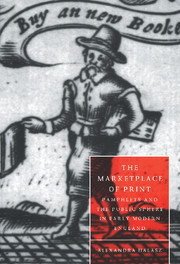Introduction
Published online by Cambridge University Press: 10 December 2009
Summary
Thomas Bodley famously wanted to exclude pamphlets from the library he founded at Oxford in 1603, claiming that they were “not worth the custody in suche a Librarie.” The librarian must have occasionally disagreed, for over the years Bodley becomes increasingly admonitory: “the benefit therof will nothing neere contervaile, the harme that the scandal will bring unto the Librarie, when it shalbe given out, that we stuffe it full of baggage bookes”(222). “Baggage” means moveable or portable property. From the sixteenth century to the eighteenth, it is also a term of abuse, meaning “trashy” or “valueless”; a gendered abusive use referring to women who are promiscuous in speech or behavior continues into the nineteenth century. “Baggage books” are literally portable; they have been published in small formats (such as quarto or octavo) that allow for ease of transportation, of circulation. Bodley will not have them in the library both because they circulate too widely and because they do not require the learned man's critical and custodial attention in order to circulate. But the scandal that the pamphlets portend to Bodley – that, included in the library, the pamphlets will undermine the authority of the Library – is not dissipated by their exclusion. Rather, the gesture of exclusion makes a problem of pamphlets' claim to discursive authority explicit even as it attempts to assign them to another, amorphous place. It is a gesture whose implications may become clearer if we substitute for “baggage” the term “mass market.”
I do not make a four-century historical leap lightly. Whether the distinguishing term is “baggage,” “pamphlet,” or “mass market,” the boundary between discourses that count and those that do not has repeatedly been drawn in relation to the marketplace-situatedness of discourse.
- Type
- Chapter
- Information
- The Marketplace of PrintPamphlets and the Public Sphere in Early Modern England, pp. 1 - 13Publisher: Cambridge University PressPrint publication year: 1997
- 1
- Cited by



